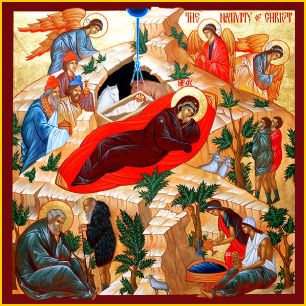|
|||
|---|---|---|---|
| This weekly bulletin insert complements the curriculum published by the Department of Christian Education of the Orthodox Church in America. This and many other Christian Education resources are available at http://dce.oca.org. | |||

One of the ways we celebrate the Nativity of Our Lord Jesus Christ is to sing the Troparion of the Feast. The words of the hymn describe Jesus Christ as the light of the world, the Sun of Righteousness and the Orient from on high. The hymn also refers to the wise men from the East who followed a star to find this newborn King. Depictions and descriptions of the wise men differ. They are sometimes called Caspar, Melchior and Balthasar, but have also been given other names. In Western art they are often shown riding camels, presumably to indicate that they come from the East, but in icons they ride horses, a way of showing that they wanted to get to the Savior as quickly as possible. Swift horses can certainly maintain a different pace from that of plodding camels, though the ride was arduous no matter what animals they rode. While in many representations all three men look to be approximately the same age, icons show one as distinctly older than the other two, emphasizing that the urgent work of seeking salvation is for people of all ages, just as it is for people of every background and origin. One word that is used by most traditions to identify the three travelers is "magi." This word brings to mind images of men who watched the stars closely and tried to derive wisdom from them, or who "worshipped the stars," as the Troparion states. The wise men are not the only ones to whom this word is applied. In Acts 8: 9-24 we meet a "magus" (the singular of "magi") named Simon, who says of himself that he is "something great." He is popular and is listened to because he has amazed the people with magic. But Simon's response to the truly great things he sees the apostles doing is all wrong. He hopes to buy the power they have, so that "anyone on whom I lay my hands may receive the Holy Spirit." Peter rebukes him and urges him to repent.
The magi who come to worship Jesus in the cave are quite different. They are ready to humble themselves before this Child. They are willing to be "taught by a star to adore" Him, as the Troparion puts it, not seeking to share His power but just to offer Him gifts. They are ready to accept what God is showing them by means of a star that is different from all the stars they have studied so attentively. In his poem "Journey of the Magi" T.S. Eliot writes that the men returned to their kingdom homes but were "no longer at ease here, in the old dispensation, With an alien people clutching their gods." The magis' lives were changed, and perhaps they would never again be comfortable. God had shown them something entirely new in the stars, and the only possible response was the one we sing in the Troparion: "O Lord, glory to Thee." |
|||
